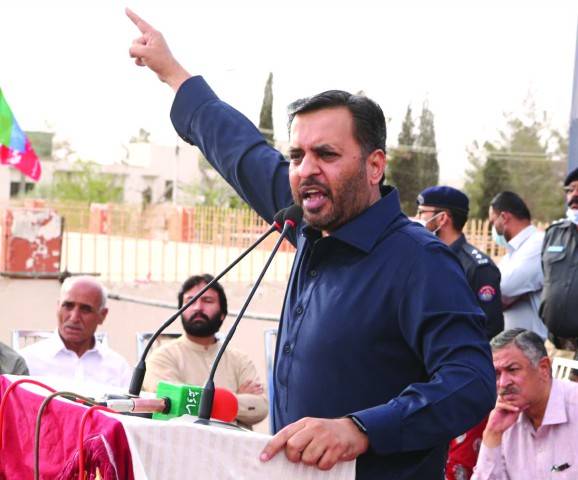
On March 19, Pak Sarzameen Party (PSP) held a major political rally in Quetta. This was the first show of strength in Quetta by any major political party since Pakistan Democratic Movement’s rally last October. PSP organized this rally to commemorate its fifth founding anniversary. Although the rally caused some inconvenience to the people of Quetta because of traffic congestion, it was a significant development in the political landscape of Balochistan.
Speaking at the rally, PSP Chief Mustafa Kamal played to the emotions of the crowd. He asked state institutions to resolve conflict in Balochistan through dialogue. He also advised the local youth to not allow foreign hostile forces to use them against their own country. He sounded like a typical political leader whose words resonated with the local people. It was a good effort to win the trust of the people of Balochistan.
Karachi is the base of PSP yet Quetta was chosen for the rally for the party’s fifth anniversary. This explains the political strategy of PSP: to focus on Balochistan and establish long-lasting political footprints in the restive province which has a population less than Karachi city. All of this hints towards the primary goal of PSP, which is to make inroads in Balochistan.
While PSP is trying to enter the political landscape of Balochistan, there are three factors that will determine its success. First, there is a huge political vacuum in Balochistan for mainstream politics because all major parties have ignored this province. Mainstream parties do have some presence in Balochistan when they are in government. However, when they enter opposition, their presence in Balochistan vanishes quicker than a pinch of salt in snow. This situation has left an opening for a federal party and PSP can take advantage of this.
Politics in Balochistan is polarized and there is great competition along ethnic, nationalistic and religious fronts. However, when it comes to the politics of federalist parties, there is still a vacuum. The ruling Balochistan Awami Party (BAP) is a unique experiment in the sense that it is close to the center while claims to be a Balochistan-specific party. However, BAP has also failed to cover political space in the province and its existence is dependent upon the continuity of its government. Therefore, the PSP has good chances to occupy a significant position in the politics of Balochistan provided that it plays its cards right.
The second factor to consider is the unique position of electables in the politics of Balochistan. In this province, there are 20 to 25 electables who win their seats due to their tribal clout, irrespective of which party they are in. These politicians were in the PPP and the PML-N when those two parties were in power. Now, most of these opportunistic politicians are in BAP. In the future, if PSP manages to get a significant share in the federal government then most of these electables can jump ship to join PSP. In such a case, PSP will be in a position to form a government overnight. However, the probability of this scenario is directly related to the strength of PSP in the federal government of Pakistan.

Thirdly, in Balochistan, every party’s success depends on a certain portion of votes acquired due to the political stature of its leader. BNP-Mengal’s Akhtar Mengal, PkMAP’s Mahmood Achzkzai, JUI-F’s Molana Fazlur Rehman among others have significant personality-specific vote bank. This vote bank will go to the party leader irrespective of how weak or strong the candidates of the party are in elections. In the case of PSP, its leader Mustafa Kamal does not have any such vote bank in Balochistan. This means that PSP has to work hard in elections to make any inroads. This is a weakness for PSP in the electoral landscape of Balochistan and it needs genuine and tiresome hard work to counter it.
The entry of PSP in the politics of Balochistan is a good omen for the people of the province. It will provide more options to the voters and will help in weakening the hold of existing political parties who have failed the public many times in the past. The entry of new parties such as PSP is a direct threat to the vested interests of the political elite of the province who have been in power for decades. However, this can only hold true if the PSP does not accept the same political elite in its party. If PSP also accepts the so-called electables then it will be no different than other parties. In such a case, PSP will be one among many bad options available to voters in Balochistan.
Lastly, PSP has definitely made its mark on the political landscape of Balochistan by holding this rally in Quetta, a city which does not attract many national-level political leaders. If PSP has to further capitalize on this momentum then it has to work harder than its opponents. PSP leaders have to visit Quetta more often. Once a year visits will not do any good for the party. PSP needs to focus on the youth of the province and prefer them over the existing political elite. Only such a unique approach can change the political fortunes of PSP in Balochistan.
The writer is a journalist and researcher. He can be reached on Twitter @iAdnanAamir
Speaking at the rally, PSP Chief Mustafa Kamal played to the emotions of the crowd. He asked state institutions to resolve conflict in Balochistan through dialogue. He also advised the local youth to not allow foreign hostile forces to use them against their own country. He sounded like a typical political leader whose words resonated with the local people. It was a good effort to win the trust of the people of Balochistan.
Karachi is the base of PSP yet Quetta was chosen for the rally for the party’s fifth anniversary. This explains the political strategy of PSP: to focus on Balochistan and establish long-lasting political footprints in the restive province which has a population less than Karachi city. All of this hints towards the primary goal of PSP, which is to make inroads in Balochistan.
The entry of PSP in the politics of Balochistan is a good omen for the people of the province. It will provide more options to the voters and will help in weakening the hold of existing political parties
While PSP is trying to enter the political landscape of Balochistan, there are three factors that will determine its success. First, there is a huge political vacuum in Balochistan for mainstream politics because all major parties have ignored this province. Mainstream parties do have some presence in Balochistan when they are in government. However, when they enter opposition, their presence in Balochistan vanishes quicker than a pinch of salt in snow. This situation has left an opening for a federal party and PSP can take advantage of this.
Politics in Balochistan is polarized and there is great competition along ethnic, nationalistic and religious fronts. However, when it comes to the politics of federalist parties, there is still a vacuum. The ruling Balochistan Awami Party (BAP) is a unique experiment in the sense that it is close to the center while claims to be a Balochistan-specific party. However, BAP has also failed to cover political space in the province and its existence is dependent upon the continuity of its government. Therefore, the PSP has good chances to occupy a significant position in the politics of Balochistan provided that it plays its cards right.
The second factor to consider is the unique position of electables in the politics of Balochistan. In this province, there are 20 to 25 electables who win their seats due to their tribal clout, irrespective of which party they are in. These politicians were in the PPP and the PML-N when those two parties were in power. Now, most of these opportunistic politicians are in BAP. In the future, if PSP manages to get a significant share in the federal government then most of these electables can jump ship to join PSP. In such a case, PSP will be in a position to form a government overnight. However, the probability of this scenario is directly related to the strength of PSP in the federal government of Pakistan.

Thirdly, in Balochistan, every party’s success depends on a certain portion of votes acquired due to the political stature of its leader. BNP-Mengal’s Akhtar Mengal, PkMAP’s Mahmood Achzkzai, JUI-F’s Molana Fazlur Rehman among others have significant personality-specific vote bank. This vote bank will go to the party leader irrespective of how weak or strong the candidates of the party are in elections. In the case of PSP, its leader Mustafa Kamal does not have any such vote bank in Balochistan. This means that PSP has to work hard in elections to make any inroads. This is a weakness for PSP in the electoral landscape of Balochistan and it needs genuine and tiresome hard work to counter it.
The entry of PSP in the politics of Balochistan is a good omen for the people of the province. It will provide more options to the voters and will help in weakening the hold of existing political parties who have failed the public many times in the past. The entry of new parties such as PSP is a direct threat to the vested interests of the political elite of the province who have been in power for decades. However, this can only hold true if the PSP does not accept the same political elite in its party. If PSP also accepts the so-called electables then it will be no different than other parties. In such a case, PSP will be one among many bad options available to voters in Balochistan.
Lastly, PSP has definitely made its mark on the political landscape of Balochistan by holding this rally in Quetta, a city which does not attract many national-level political leaders. If PSP has to further capitalize on this momentum then it has to work harder than its opponents. PSP leaders have to visit Quetta more often. Once a year visits will not do any good for the party. PSP needs to focus on the youth of the province and prefer them over the existing political elite. Only such a unique approach can change the political fortunes of PSP in Balochistan.
The writer is a journalist and researcher. He can be reached on Twitter @iAdnanAamir

